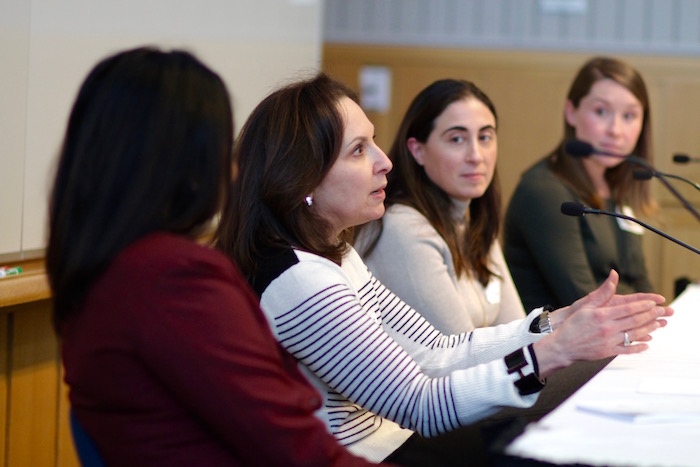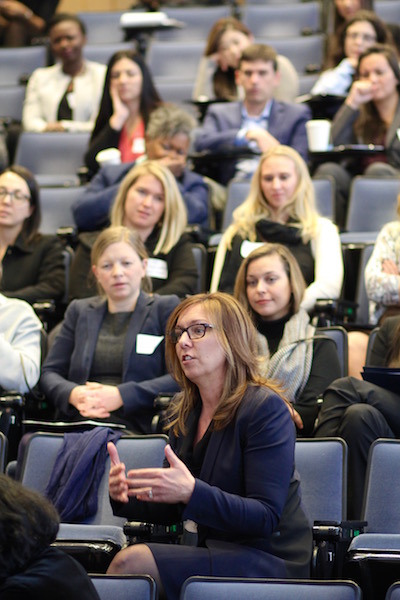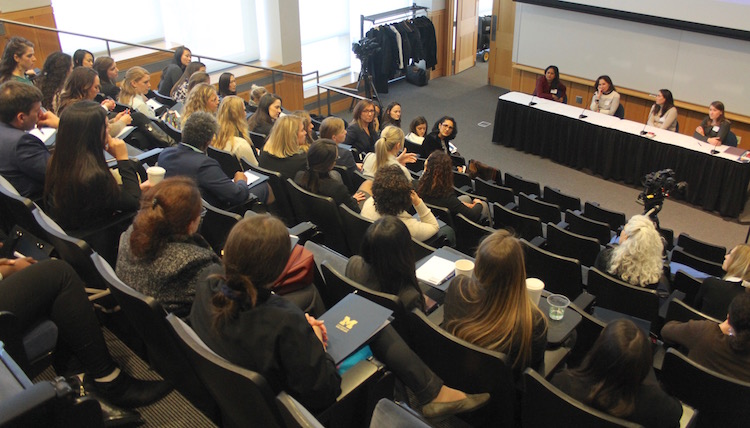Drawing more women to OMFS requires mentors, networking, advocacy7 min read
U-M symposium examines longstanding gender gap
Ann Arbor, Mich., Jan. 29, 2018 -– Better recruitment of female undergraduate and dental students into Oral and Maxillofacial Surgery, and better networking and mentoring among those already in the field, were themes that emerged during a two-day symposium last weekend at the University of Michigan.

The Women in Oral and Maxillofacial Surgery Symposium 2018 brought about 70 people, mostly women, from around the country to discuss how to interest more dental students in the specialty and how to deal with challenges that female surgeons encounter in their careers.
Sponsored by the U-M School of Dentistry’s Department of Oral and Maxillofacial Surgery/Hospital Dentistry, the symposium is the first step in what organizers hope will be a wider national discussion of the issues.
Speaker Bonnie Padwa, an OMF surgeon and associate professor at the Harvard School of Dental Medicine, provided a historical overview dating to the late 1950s and early 1960s when a Chicago-area surgeon named Elaine Stuebner completed her training and became the first woman certified as a diplomate to the American Board of Oral and Maxillofacial Surgery. While there has been a significant increase since then in the number of women in surgery in general, and in OMFS in particular, the growth has leveled off at a low percentage, Padwa said.

Women now make up at least half of the graduating classes at most dental schools, Padwa noted, so the pool of female OMFS candidates has never been larger. Yet only about 15 percent of the students in OMFS training programs are women, and only 7 percent of the members of the American Association of Oral and Maxillofacial Surgeons are women. “It’s a little dismaying, a little concerning, why we are so poorly represented in OMFS when dentistry is at least 50-50, if not more, in this day and age,” Padwa said.
Symposium speakers said there are no definite answers, only theories, about the discrepancy. Much of it is based on decades-old practices, traditions and gender bias in greater society as well as in the medical profession. Surgery is a demanding profession and a common perception was that women don’t have as much physical and emotional strength as men, Padwa said. Another perception was that patients wouldn’t accept or trust women surgeons as much as male surgeons, she said. Those notions have been refuted in recent years by several studies that showed OMFS practitioners and directors of training programs said women are as capable and skilled as men in the specialty. Other research has shown that patients accept female and male surgeons equally.
Lifestyle factors – or perhaps more accurately, lifestyle perceptions – also play a role for those considering OMFS, Padwa said. Women who choose dentistry as a career sometimes cite its more flexible schedules compared to other medical careers, she said, but studies show female surgeons follow national trends related to marriage, divorce, number of children and other lifestyle issues. “Women may be concerned that being a surgeon may compromise their ability to get married and have kids, but the reality is there is no difference between female oral surgeons and the rest of the female population in this country,” Padwa said.
Much of the two-day program emphasized mentoring and networking for recruiting students and for improving the personal and professional success of those already practicing the specialty. Topics included “Dealing with Discrimination or Sexism,” “Building an Academic Portfolio of Research and Funding” and “Rising to Leadership and Cracking the Boys Club.”

Dana Telem, an associate professor of general surgery and director of the University of Michigan Comprehensive Hernia Program, said women considering the training program or in the early stages of their careers need to find a mentor who can help them work toward answering the questions, “What do you want to do with your life?” and “What do you want to be known for?” Mentors must be committed and engaged, timely in their feedback and not afraid to offer constructive criticism. Conversely, mentees need to be receptive to advice and able to work through criticism. “No one person is going to be your mentor in all ways. And different people are going to mentor you in different ways,” Telem said. “It’s up to you to figure out how you need to be mentored and who can fill that gap for you.”
Donita Dyalram, assistant professor of Oral and Maxillofacial Surgery at the University of Maryland Medical Center, said mentors can be both designated and informal. She said she realized in recent years that her career has advanced because of many unofficial mentors who took the time to give advice or discuss issues she faced. Mentors aren’t necessarily older and more experienced, she said; they may be peers or others who are excellent communicators and willing to help think through problems. She also noted that mentoring needs change as a person’s career grows, so mentors will change, too.
Organizers of the symposium, held Jan. 19-20 at Palmer Commons, included faculty, staff and the three women – Sara Anderson, Karen Carver and Kelly Sayre – who are among the 18 residents currently in the U-M OMFS training program. The three women are the most ever in the program at once.
Carver said networking, role models, mentoring and the need for more women in leadership positions were key issues during the weekend. Leadership through interactions with faculty and staff in everyday practice is important; so is nominating women for professional societies, boards, governing bodies and awards. Those who attended the symposium gained a greater sense and better context for the lack of diversity among OMF surgeons, Carver said. “Although everyone had a sense that representation was quite low, we had some numbers to actually define the problem,” she said. “We had a clearer vision of where we’d been and what kind of work there is to be done in the future. There was a sense of shared experience that I hadn’t really appreciated up until this point.”
Carver said there was enthusiastic support for continuing with an annual conference on these issues for next year and beyond, with an emphasis on translating discussion and shared vision into specific goals. “There was a recognized need for action, and I think we’re going to work on defining the agenda so what we do tackle has good chance of success,” she said.
The symposium program is available on the event website.
###
The University of Michigan School of Dentistry is one of the nation’s leading dental schools engaged in oral health care education, research, patient care and community service. General dental care clinics and specialty clinics providing advanced treatment enable the school to offer dental services and programs to patients throughout Michigan. Classroom and clinic instruction prepare future dentists, dental specialists, and dental hygienists for practice in private offices, hospitals, academia and public agencies. Research seeks to discover and apply new knowledge that can help patients worldwide. For more information about the School of Dentistry, visit us on the Web at: www.dent.umich.edu. Contact: Lynn Monson, associate director of communications, at [email protected], or (734) 615-1971.
